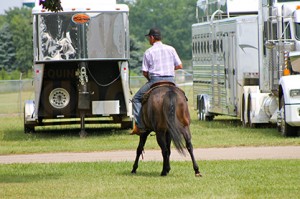Don’t Let Ulcers Derail Your Horse This Show Season
Merial press release
Long hours in the saddle…….trailering to lessons……..scrimping and saving to pay for show fees………cleaning tack………body clipping……….polishing hooves.
The preparation work for the first show of the season is time-consuming and sometimes tedious. But equine enthusiasts around the country couldn’t imagine spending their time doing anything else right now – that show is right around the corner.
Besides the off-season legwork, what else can competitors do to bring their A-game to each and every event?
It would seem to go without saying, but taking care of a horse’s health is paramount to the success of any competitor. “An ongoing, overall health care plan that includes consultation with a veterinarian, appropriate nutrition, hoof care and annual vaccinations is imperative for any horse, whether they are competing or not,” says Megan Green, DVM, manager, Large Animal Veterinary Services, Merial. “For those horses traveling, being introduced to new environments and going through the added stress of training and conditioning, there are even more considerations,” she says.
One of the most common and sometimes debilitating health issues impacting horses is equine stomach ulcers. In fact, two out of three non-racing competitive horses suffer from stomach ulcers.1 “Competing horses are particularly susceptible to equine stomach ulcers,” says Green. “All the activities associated with competing, including training, traveling, stall confinement and changes in environment can cause stress, which can lead to the development of ulcers.”2
Although some horses do not show clinical signs of ulcers, others do, and those can include:
- Altered eating and drinking behavior
- Change in attitude (for the worse)
- Dull hair coat
- Weight loss
- Recurrent colic3
Preventing equine stomach ulcers from occurring is the best way to ensure they don’t inhibit a horse’s performance. “Equine stomach ulcers can negatively impact a horse’s health. Trying to treat them after they occur can be more costly – in terms of time and money – than preventing them,” says Green.
ULCERGARD® (omeprazole) is the only proven and FDA-approved product for the prevention of equine stomach ulcers. “There are other products on the market that claim to prevent ulcers, but ULCERGARD is the only one that has been proven to be safe and effective,” says Green. “It’s important that horse owners not waste time and money, and jeopardize their horse’s health by using products that have not been thoroughly tested.”
Another measure horse owners can take to help them bring their A-game is to manage equine osteoarthritis (OA). “It’s not uncommon for competing horses to suffer from OA. They are athletes and have a lot of wear and tear on their joints,” says Green.
To manage the pain associated with OA, horses owners can use EQUIOXX® (firocoxib) Oral Paste, a nonsteroidal anti-inflammatory that offers 24 hours of pain relief. EQUIOXX Oral Paste is the only NSAID approved for use up to 14 consecutive days by both the American Quarter Horse Association4 and United States Equestrian Federation,5 when used at its recommended dose at least 12 hours prior to competing.
Competing horse owners should also be aware of any potential health threats in the areas to which they are traveling advises Green. “The only sure way to help prevent equine disease is by vaccinating, but horse owners can also take advantage of the free Outbreak Alert program.”
Through the free program, horse owners can be alerted via text or email when diseases have been confirmed in specified geographic areas. At the Outbreak Alert website, www.outbreak-alert.com, maps of the United States highlight locations of confirmed cases of the following diseases:
- Eastern Equine Encephalitis (EEE)
- Western Equine Encephalitis
- West Nile Virus (WNV)
- Equine Herpesvirus
- Rabies
- Potomac Horse Fever
“Horse owners invest significant financial and emotional resources in their horses and want what is best for them,” says Green. “Many of us at Merial are also horse owners and understand how important it is to keep horses healthy.”
For more information about ULCERGARD, visit www.ulcergard.com
For more information about EQUIOXX, visit www.equioxx.com.
To sign up for Outbreak Alert, visit www.outbreak-alert.com.
IMPORTANT SAFETY INFORMATION:
ULCERGARD can be used in horses that weigh at least 600 pounds. Safety in pregnant mares has not been determined.
IMPORTANT SAFETY INFORMATION:
As with any prescription medication, prior to use, a veterinarian should perform a physical examination and review the horse’s medical history. A veterinarian should advise horse owners to observe for signs of potential drug toxicity. As a class, nonsteroidal anti-inflammatory drugs may be associated with gastrointestinal, hepatic and renal toxicity. Use with other NSAIDs, corticosteroids or nephrotoxic medication should be avoided. EQUIOXX has not been tested in horses less than 1 year of age or in breeding horses, or pregnant or lactating mares. For additional information, please refer to the prescribing information or visit www.equioxx.com.
®ULCERGARD and EQUIOXX are registered trademarks of Merial. ©2014 Merial Limited. Duluth, GA. All rights reserved. EQUIUGD1404 (02/14)
1Mitchell RD. Prevalence of gastric ulcers in hunter/jumper and dressage horses evaluated for poor performance. Association for Equine Sports Medicine. September 2001.
2ULCERGARD product label.
3Equine Gastric Ulcer Council. Recommendations for the diagnosis and treatment of Equine Gastric Ulcer Syndrome (EGUS) Equine Vet Educ1999;11:262-272.
4American Quarter Horse Association. Show rules and regulations. Official Handbook of Rules and Regulations. Available at:www.aqha.com/Resources/2014-Handbook/Violations/VIO405-406-Conditionally-Permitted-Medications.aspx. Accessed February 4, 2014.
5United States Equestrian Federation. Show rules and regulations. Drugs and Medications Rules. Available at:https://www.usef.org/documents/drugsMeds/ruleBook.pdf. Accessed February 4, 2014.











